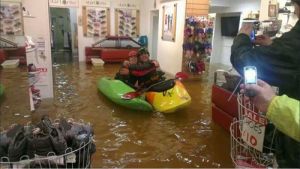And it must be totally devastating. The impact of flooding on small businesses across affected regions is huge and has a wider economic knock on affect elsewhere. In excess of 185,000 commercial properties are at risk of flooding across England and Wales thanks in large part to more extreme weather patterns – as a result of climate change – along with building on flood plains, and cultivation of natural areas. According to the Environment Agency (www.knowyourfloodrisk.co.uk), over the next 25 years it is expected that many more properties will be affected by flooding for the very first time.
For starters, floods result in thousands of pounds’ worth of damage to the premises. Your plant, stock, any equipment you have, as well as furniture and fixtures and fittings will all be affected. Flood water causes damage of course, but so does accumulated debris that has been swept down and into premises, and of course once the waters have subsided, the small business owner has to deal with issues of humidity, contamination, mould and disruption to power supplies.
Depending on how badly the premises is affected, it can take weeks to clean up and re-open. A friend of mine was closed for four months after coastal encroachment and sea flooding occurred in February 2015. She didn’t reopen until June, when the season had already started, because she waited weeks for the floor and walls to dry out and then had to have a rewire, re-plaster and a shop refit.
It can take months for businesses to return to normal, and in the meantime, customers may take their business elsewhere.
Calderdale Council and DEFRA jointly produced a report in January 2015, Impact of flooding and flood risk on community economic resilience in the Upper Calder Valley, that aimed to understand ‘the scale, reach and complexity of the economic impacts of flooding and flood risk in the Upper Calder Valley and how this relates to community economic resilience.’
They found that the effects of flooding have an accumulative impact locally and that this in turn impacts on supply and demand chains, and that while there are some positive outcomes to flooding on a community (in terms of bringing a community together for example), ‘the negative impacts on the local area significantly outweighed the positive.’ The Calderdale Council and DEFRA report highlighted that from 26 businesses where impacts could be quantified, ‘net losses totalled £823,900’ and in turn reduced trade for local suppliers for up to a year.
Thereafter, once businesses started up again, it was noted that there was ‘ongoing cautiousness in purchasing’ and of course an increase in insurance premiums.
The report highlighted that ‘the biggest loss to the local economy came from the drop in trade amongst businesses and their supply chains in the months after the floods (£831,324 from 21 businesses)’ and that where there were comprehensive insurance pay-outs (certainly not evident in every case), this ‘gives a greater earning potential for the area to assist recovery’.
It would appear that decent insurance pay-outs are vital to economic recovery – both for small businesses and the communities that support them – in the aftermath of flooding. It was sad to see therefore, that some businesses that were hit by flooding had not been able to get a decent insurance policy in place. If insurance companies refuse to cover those at risk of flooding, it can mean a loss to community retail.
The Environment Agency note that flooding in 2007 affected 9,000 businesses, and the cost to them averaged between £75,000 and £112,000, with the cost to infrastructure companies (such as water supplies and power networks) calculated at £660 million. Damage to communications, transport and roads amounted to approximately £230 million, with accumulated costs to local councils of £140 million.
It is recommended that if you are a small business at risk of flooding, however unlikely it seems, you should have a flood plan in place.
Essentially a Business Flood Safe Plan will
• Help to save lives and prevent injury
• And potentially risk damage to your stock, equipment and fittings
• It will reduce the amount of time you are unable to run your business
• And ensure your customers return when you reopen
• Hopefully minimize a loss of profits.
How much could a flood cost your business?
• What would be the replacement cost of your stock, plant, equipment and fittings located up to 1.5m above the level of your floor?
• Imagine you are closed to clean up, what would be the value of fixed costs such as wages, rent and loan repayments that require payment regardless of whether or not your business is operating?
• How much profit would you expect to lose while you are closed?
• Do you have cover for flooding on your insurance policy?
Measures to consider
The average losses from a flood are in the region of £30,000, compared to £1033 for a burglary or £7,300 for a fire. If you have a security alarm fitted to your business, maybe it’s also time to consider flood measures. Forewarned means being prepared and preparation can save you 90% of the cost of lost stock and equipment.
• Build or install permanent or removable barriers that seal your doors and windows and other openings such as drains and toilets
• Raise electrical sockets, electrical wiring and controls for ventilation.
• Ensure equipment or machinery is raised
• Use lime-based plaster instead of gypsum on your walls
• Back up your customer date on a regular basis and store your files and contracts safely.
• Make sure your insurance policy is in a safe place
Obviously taking measures can be costly and not all small businesses have the cash to do so. Grants would be nice, rather than retroactive measures taken in the aftermath, but let’s not hold our breath, eh?
 Wholesale
Wholesale 
Comments are closed.